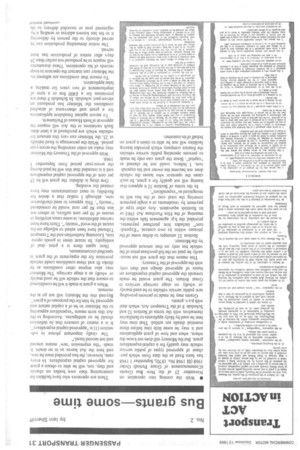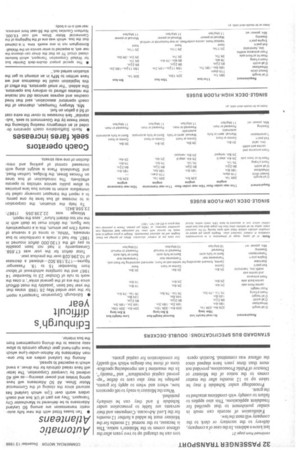No. 2 by lain Shernff
Page 33

Page 34

If you've noticed an error in this article please click here to report it so we can fix it.
Bus grants some time
• With the coming into operation on November 25 of the New Bus Grants (Commencement of Grant Period) Order 1968 (SI 1968 No. 1870), September 1 1968 has been fixed as the date from which purchase of approved types of public service vehicle may qualify for a capital expenditure grant. But the Ministry still does not know the where, when and how of grant applications and it may be some little time before these essential details are settled. That time may best be used by likely applicants to familiarize themselves with the terms of Section 32 and Schedule 8 of the Transport Act, which deal with p.s.v. grants.
Grants may be made to persons providing new public service vehicles to be used mainly or wholly on stage carriage services in Great Britain. The grant would be made towards the approved capital expenditure on buses of approved design and then only with the approval of the Treasury.
This means that the grant will not necessarily be paid on the full purchase price of the vehicle but only on that amount approved by the Minister.
Section 32 attempts to define some of the phrases within its own content. "Expenditure" includes hire purchase payments, provided the h.p. agreement falls within the meaning of the Hire Purchase Act 1965 or its Scottish equivalent. Any other type of payment by instalments or a single payment covering the total cost of the bus will be recognized as "expenditure".
In the terms of Section 32 it appears that leasing will not qualify for a grant. In such cases the operator who leases the vehicle does not become the owner and his expenditure, I believe, could not be classed as "capital". Since the grant can only be made to persons operating public service vehicles the finance company which provides leasing facilities will not be able to claim a grant on behalf of its customer.
There are operators who have facilities for constructing their own bodies on chassis and they, too, will be able to obtain a grant for approved capital expenditure. In every case, however, the bus provided must be new, and here the Act leaves us in no doubt. It reads "the expression 'new' means unused and not second-hand."
The vitally important phrase in subsection (1) is "approved capital expenditure". It is a matter of concern that its definition should be so ambiguous. According to the Act this term means `.`expenditure appearing to the Minister to be of a capital nature and approved by him for the purposes of a grant". Beyond this the Ministry will not go at the moment.
When a grant is made it will be conditioned to ensure that the vehicle will be used mainly or wholly as a stage carriage. The Minister may also impose other conditions as he thinks fit and these conditions could include provision for the repayment of the grant in specified circumstances.
Here again there is a great deal of ambiguity. In recent times in goods operation, Licensing Authorities and the Transport Tribunal have been asked to adjudge on the extent of the word "mainly". There have been various definitions; in some cases anything in excess of 50 per cent suffices, in others not less than 80 per cent would be considered "mainly". This appears to need clarification now, although I realize that a desire for flexibility to meet circumstances may have created the wording.
One thing is definite: the grant will be 25 per cent of the approved capital expenditure and it is intended that this will be paid during the seven-year period from September I 1968.
With approval of the Treasury the Minister may make an order extending the seven-year period. While the percentage is fixed initially at 25, the Minister can vary this. amount for vehicles which are purchased at a later date. Such variations in the Act will require the approval of both Houses of Parliament.
To secure against fraudulent applications for a grant and observance of attached conditions the Minister has produced an eleven-part schedule. In Schedule 8 there are provisions for a £400 fine or a term of imprisonment of two years for making a false application.
To ensure that conditions are adhered to. the Minister can instruct the operator to keep records of his operations. These documents will require to be produced not earlier than 28 days after notice of production has been served.
The notice demanding production can be served directly to the person by delivering it to his last known address or sending it by registered post or recorded delivery to his last known address. In the case of a company, delivery to the secretary or clerk to the company will meet the law.
Falsification of records can result in similar punishment to that specified for fraudulent applications. This also applies to failure to comply with conditions attached to the grant.
Proceedings under Schedule 8 may be taken up to 12 months after the matter comes to the notice of the Minister or Director of Public Prosecutions, provided not more than three years have elapsed since the offence was committed. Scottish opera
tors can be charged up to two years after the offence comes to the Minister's notice. This is because, to the normal 12 months for the Minister must be added a further 12 months for the Lord Advocate. Companies and their servants are liable to prosecution under Schedule 8 and they can be similarly punished.
When the Minister is ready to tell operators how, where and when to apply for grants, perhaps he may also care to define "approved capital expenditure" and "mainly". In the meantime I am reproducing specifications of those bus designs which will qualify for consideration for capital grants.












































































































